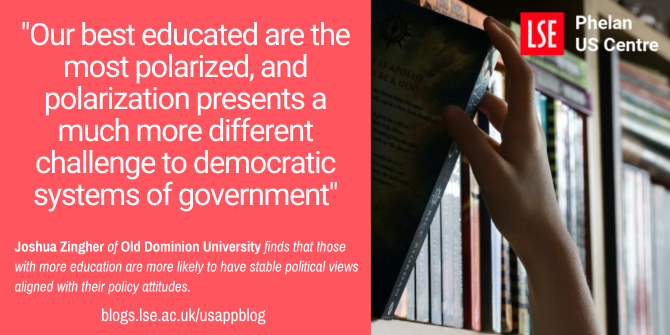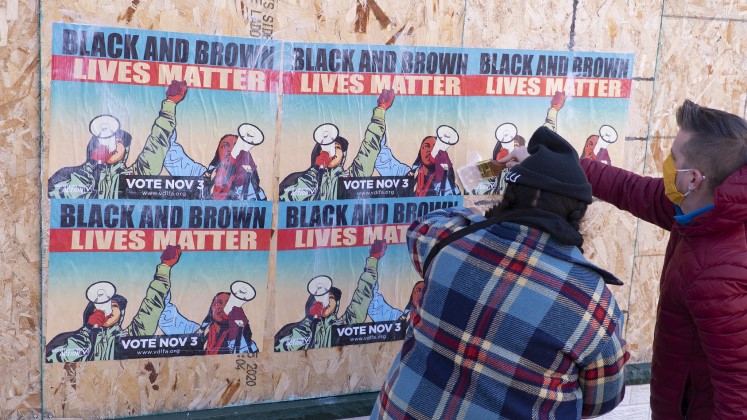 How do people make decisions about which political party to support? One school of thought suggests that people’s attitudes towards politics and policies shapes their decisions, while another argues that a person’s attachment to a particular political party is what matters. In new research, Joshua Zingher uses survey data to investigate how peoples’ partisanship and policy attitudes influence each other. He finds that not only do people update their partisanship to better match their policy attitudes, but they also change their policy positions to better match the views of their chosen political party. What’s more, the most educated people held the most stable and the most extreme policy attitudes and partisanship.
How do people make decisions about which political party to support? One school of thought suggests that people’s attitudes towards politics and policies shapes their decisions, while another argues that a person’s attachment to a particular political party is what matters. In new research, Joshua Zingher uses survey data to investigate how peoples’ partisanship and policy attitudes influence each other. He finds that not only do people update their partisanship to better match their policy attitudes, but they also change their policy positions to better match the views of their chosen political party. What’s more, the most educated people held the most stable and the most extreme policy attitudes and partisanship.
“How much do people know about politics?” is a question that political scientists have been wrestling with for decades. Democracy rests on the idea that citizens can act as a check on politicians. If politicians get too far out of line, people will vote them out of office. But how can voters evaluate elected officials if people do not know anything about politics or lack any type of meaningful political attitudes? This is a problem given how we think democracy is supposed to work.
Does competency or partisanship matter in guiding political choices?
Political scientists have created two main schools of thought in response to this potential problem with democratic theory. One is that we underestimate the average citizen’s competency. According to this perspective, people have meaningful attitudes about politics and policy and use these attitudes to help guide their political choices. A second school argues that partisanship, a person’s psychological attachment to a political party, is what really matters. People identify with a party and look to that party’s leaders to know where to stand on the issues. If people realize they hold a belief that conflicts with their party leaders, they will just change their belief rather than look for a new party.
In new research I put these competing explanations to the test. I used American National Election Study and General Social Survey panel data to examine how an individual’s partisanship and policy attitudes influence each other over a period of two or four years. I ask whether people change their policy attitudes to better match their party? Or do they start to identify with a different party? This is a question of how people change their attitudes over time.

Photo by Pierre Bamin on Unsplash
To answer these questions, I first created composite measures of American’s economic and social policy attitudes based on their responses to questions about specific policies. The economic policy measure is built on questions about taxes, government sponsored health insurance, and government aid to the poor. The social policy measure is built on questions that ask about “culture war” issues like abortion, gay rights, and the importance of traditional gender roles. I then used cross lagged regression models to examine how an individual’s current economic and social policy attitudes and partisanship influence their partisanship and policy attitudes two or four years in the future.
Policy attitudes and partisanship both matter for political choices
What I found was policy attitudes and partisanship jointly influence each other. People update their partisanship to better match their policy attitudes. They also change their policy positions to better match the views of their party. While there are some reciprocal influences, I found that an individual’s policy attitudes and partisanship are highly stable. This is especially true of culture war attitudes, which strongly influence partisanship but are only weakly influenced by partisanship.
I also assessed whether an individual’s level of education influenced the interrelationships between these variables. What I found was that the most educated people, those with a bachelor’s degree or above, held the most stable and the most extreme policy attitudes and partisanship. Additionally, they are the most “well sorted,” meaning they hold policy attitudes that closely align with the party they identify with. However, I find evidence that all educational groups hold reasonably stable policy attitudes and partisan attachments.
Polarization is what’s important
My analysis helps to explain some of the changes in partisan attachments we have seen in recent years. As the recent Wisconsin Supreme Court election illustrated, college educated citizens have been rapidly shifting towards the Democratic Party. In my view, these voters are bringing their partisanship in line with their liberal attitudes on the increasingly polarizing “culture war” issues—abortion in particular. The reverse can be said of socially conservative Whites without a college degree. They have moved away from the Democratic Party and towards the Republicans, largely because of the gulf between the parties on social issues.
Overall, my findings suggest that the people have meaningful policy attitudes. This should provide some comfort to those who worry that mass ignorance might doom democracy. On the other hand, I find that policy attitudes and partisanship are mutually reinforcing, especially among the best educated. In other words, our best educated are the most polarized, and polarization presents a much more different challenge to democratic systems of government.
- This article is based on the paper, ‘How Educational Attainment Moderates the Recursive Relationship Between Policy Orientations and Partisanship’ in American Politics Research.
- Please read our comments policy before commenting.
- Note: This article gives the views of the author, and not the position of USAPP – American Politics and Policy, nor the London School of Economics.
- Shortened URL for this post: https://bit.ly/43rTWVi






